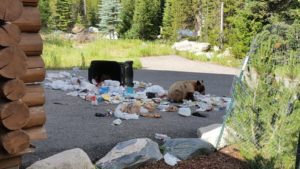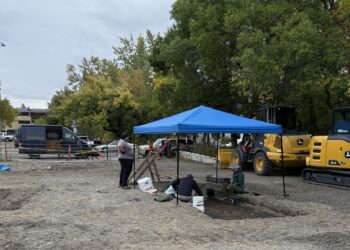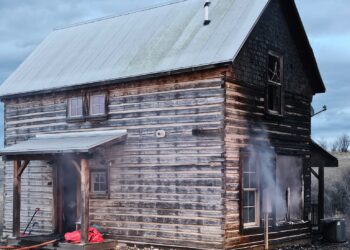By Jessianne Wright
EBS Contributor
BIG SKY – The bears around Big Sky know winter is in the air. Beginning in August and lasting until hibernation sometime in the fall, bears of the Greater Yellowstone set out on a quest for food. This period of intense food consumption is referred to scientifically as hyperphagia, and is likely the cause of the latest spike in bear-human conflicts.
At EBS press time on Aug. 29, Montana Fish, Wildlife and Parks bear management specialist Kevin Frey reported that five bears had been relocated from Big Sky during the month of August alone, one of which was subsequently euthanized after it moved from the relocation area into downtown Livingston.
A sixth Big Sky black bear was euthanized due to a long history of human conflict. “We try to give them a chance. It was just so habituated to things in Big Sky,” Frey said.
He also reported that an adult female back bear was hit and killed by a car on Lone Mountain Trail near the entrance to West Fork Meadows during the weekend of Aug. 25 and 26. The presence of a small ear tag indicates that this bear had been captured in Big Sky five years ago and was relocated to the north end of the Crazy Mountains due to problems with humans.

“We can remove and issue, but it doesn’t mean that it solves it,” Frey said. “They can eventually find their way home.
“In hyperphagia, bears become a hair more bold,” he added. “With all the effort that’s going on in Big Sky, it’s just unfortunate that bears are still finding access to open windows or unsecured areas.”
Outside of hyperphagia, a black bear consumes between 5,000 and 8,000 calories a day, while the average man eats approximately 2,500 calories each day. In preparation for denning, that number could nearly triple, amounting to between 15,000 and 20,000 calories daily, said Kris Inman, the community partnerships coordinator for the Wildlife Conservation Society, who oversees the Bear Smart Big Sky initiative.
In a natural setting, bears will eat grass, late-season berries, insects and small animals, as they are available, Inman added. However, at the wildland-urban interface, a bear could easily encounter trash, bird seed or other human products that could become attractive.
Frey said for this very reason, FWP has received 32 reports of human-bear conflicts in Big Sky during 2018 since bears awoke from hibernation in the spring.
“Big Sky is a beautiful place to grow up and be a black bear. Bears are always going to be in Big Sky,” Frey said. “So if we don’t want conflict, we have to be very diligent.”
At Big Sky Resort, all of their garbage receptacles are bear-proof, apart from four that are put out in the plaza every morning and brought in at night, said John Knapton, the resort’s mountain manager. They are also working with an area contractor to develop bear-resistant grease receptacles for their restaurants.
“We want to be a good partner to the community and we want to be good stewards of the wildlife,” he said.
Currently, through partnerships with Bear Smart Big Sky, 70 percent of homeowners are required to utilize bear-resistant garbage cans, which is enforced by a number of area homeowners’ associations. Residents and visitors are also urged to keep windows and garages closed when no one is home and avoid putting out bird seed or using barbeque grills.
According to Ben Holst, the executive director of community associations for Lone Mountain Land Company, which oversees residential property in the Spanish Peaks Mountain Club and Moonlight Basin, as well as commercial areas throughout Big Sky, one challenge Big Sky faces is the number of part-time residents.
“There’s an unfortunate lack of knowledge when you aren’t here all the time,” he said. “It’s unfortunate because the bears were already here. When they [get into trouble], it’s not because the bears are doing something wrong, it’s because we’re doing something wrong.”
Holst added that LMLC maintains a security staff that routinely checks to make sure bear-proof garbage cans are being properly utilized, and they clean up trash if it’s left out. While Spanish Peaks offers curb-side trash pickup, Moonlight Basin includes a centralized, fully bear-proof trash facility. Holst said that this decision was made because Moonlight Basin experiences greater bear activity.
Properties in the Yellowstone Club are also serviced by a centralized garbage facility, in which garbage and recycling is stored indoors. Rich Chandler, the club’s environmental manager, said this move is perhaps their biggest accomplishment for bears.
“We try really hard to keep [the club] as bear-proof as you can,” Chandler said. “If we aren’t proper stewards for wildlife, then we lose one of the most important reasons why people are attracted to live here—the wild and scenic nature of Big Sky.”
Visit wcscommunitypartnerships.org/bearsmartbigsky or bscomt.org/natural-resource-council/bear-smart to learn more about how you can live appropriately in bear habitat.














